Flinn Park encampment residents say they won’t go to shelters following closure
City pressure to move indoors leaves tenter 'completely beyond stressed'
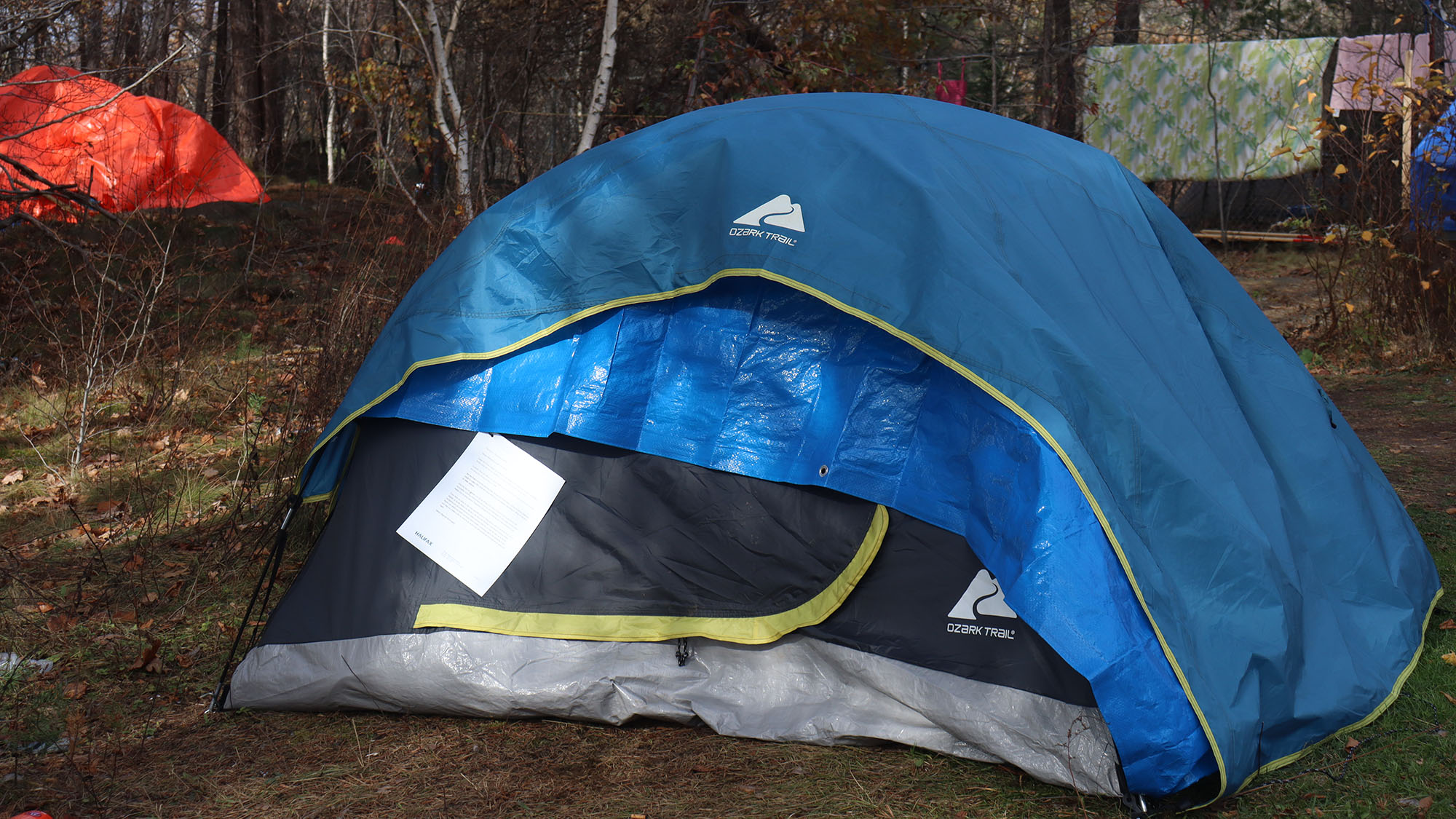
caption
An eviction notices hangs from a tent at the encampment site at Lower Flinn Park in Halifax.The impending closure of a long-term encampment site in Halifax will make the coming winter harder for tenters who’ve lived there for as long as two years.
“I just don’t know what I’m going to do,” said Cory Wood, sitting outside his tent at the Lower Flinn Park encampment site.
On Nov. 5, Wood received an eviction notice zip-tied to his tent flap, notifying him that the encampment will be “de-designated” by the Halifax Regional Municipality. Removing its designation is part of the city’s ongoing plan to transition those sleeping rough into indoor living spaces. Encampment residents will be required to collect their belongings and vacate the park by Dec. 7.
At a council meeting announcing the municipality’s Updated Framework for Addressing Homelessness in HRM, 2026-28, on Nov. 18, Mayor Andy Fillmore said that all encampment residents facing eviction will have access to shelter, and that 67 spaces are available.
The Signal spoke with Andrew Goodsell and Cory Wood, who both live at the encampment, about their plans following the closure. Both said many indoor shelter spaces are not suitable options for them, and that they will opt instead to continue sleeping rough.
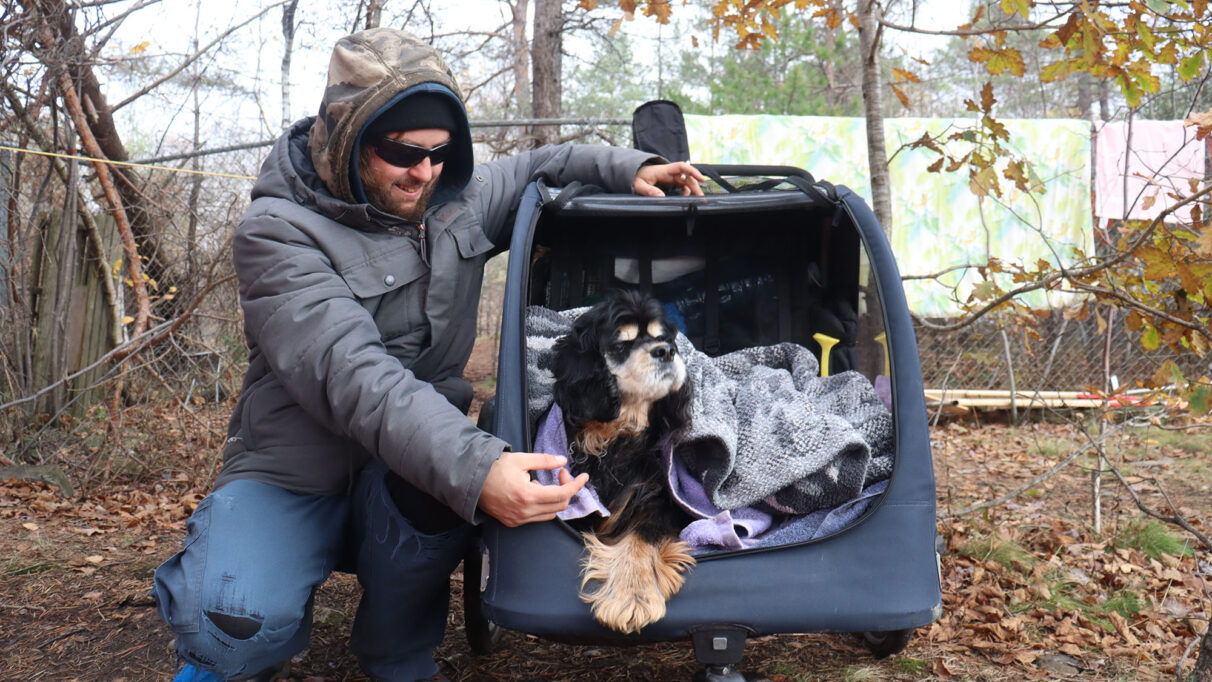
caption
Cory Wood and his dog Cookie at Lower Flinn Park.Wood, 33, has lived at Lower Flinn for about two years, and has been without a consistent indoor residence for a decade. For eight of those years, he has cared for his dog Cookie, who is blind and struggles to walk — he uses a stroller to push Cookie around throughout the day.
Wood and Cookie both experience high levels of anxiety, requiring them to seek housing options outside of shelter spaces.
“Most of them are not dog-friendly,” Wood said. He hesitates to bring Cookie inside any busy environment because, “he would never sleep.”
Wood’s name has been on the city’s “by-name list” (BNL) — a list of unhoused people who are seeking supportive housing — for two years. He doubts shelter will materialize before Dec. 7.
“It comes down to whether or not there is space for us,” Wood said. “Right now, the chances of that are slim to none.”
As of a Sept. 10 report, the BNL total is at 3,875, which is the total number of people who have sought shelter since 2022. The current of active homeless is 1,028.
District councillor Sean Cleary said he is concerned that residents who are averse to shelter environments won’t find indoor space following encampment de-designations.
“I’m glad that the province has committed to us that they have enough shelter space,” he said. “I’m still a little wary, though, that it’s the kind of space that everyone is going to need.”
Alongside the closure, the city said they will provide storage space for encampment residents’ belongings. But Wood and Goodsell are doubtful they will see their tents and gear again, and they will have to downsize regardless, to make outdoor living in the city easier. Because they expect to move often while trying to camp in non-designated areas, Wood faces the winter without his large tent and heater.
“That’s all going to be packed up and thrown away. I’ll be back to just a backpack and my basics,” he said. “My only option is to go and try to hide somewhere with my dog and my stroller.”
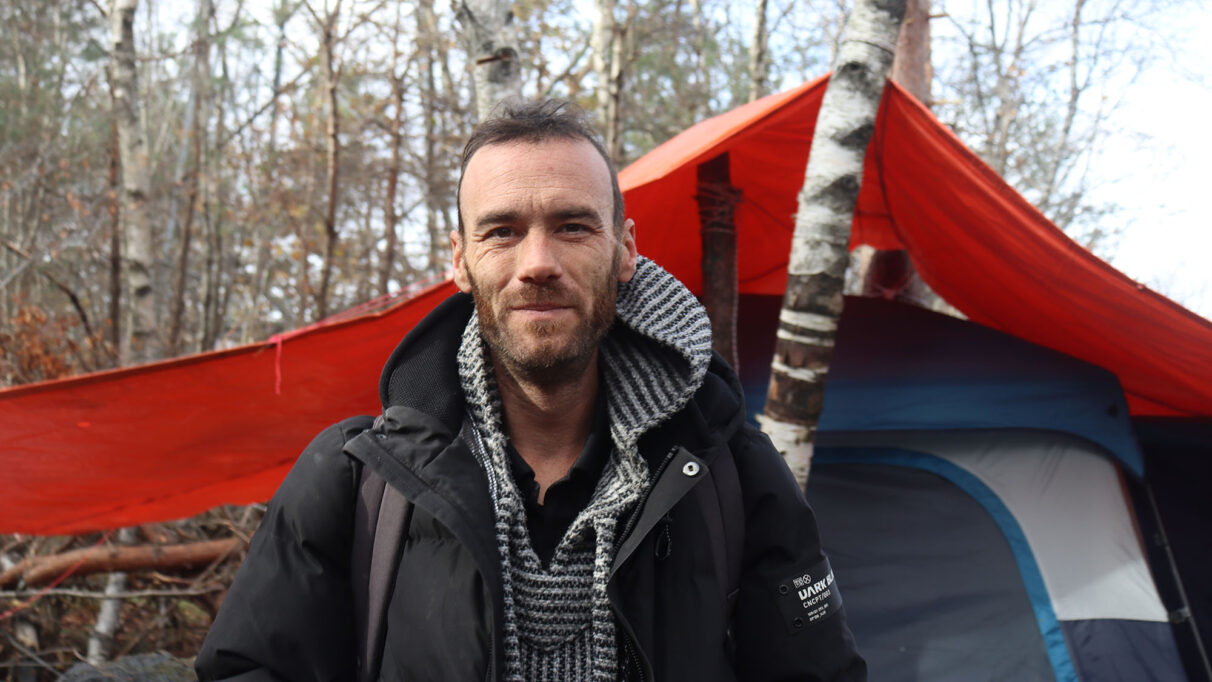
caption
Andrew Goodsell stands in front of his tent at Lower Flinn Park.Andrew Goodsell, 39, has lived outdoors with his dog, Dusty, for two years. Goodsell lost his job and indoor residence during the COVID-19 pandemic — he and Dusty have lived at Lower Flinn for one year, following the de-designation of a previous encampment on University Avenue.
“I took my dog for a walk, and when I came back, all of my stuff was in the back of a dumpster,” said Goodsell. He’s worried he’ll meet a similar fate come Dec 7.
At Lower Flinn, Goodsell is proud of the home he built and how comfortably set up he is for winter.
“I was going to be somewhat warm and dry,” he said. “When they kick us out, I’m going to have to take just the bare minimum, probably just the one small tent.”
Goodsell is also on the BNL. Immediately following the Lower Flinn closure, he will be looking for other outdoor accommodation.
“As far as I know, for the foreseeable future, my life now is on the streets.” Goodsell is wary of the shelter environment. His priority when seeking housing is a “dignified living space.”
“If I want to learn how to drink Listerine, shoot up properly, or have my mental health destroyed, I will go to a shelter,” he said.
Jeff Karabanow, the associate director at Dalhousie’s school of social work, said there are many different reasons why an individual would feel uncomfortable in a shelter.
“There’s always going to be a group of people that won’t move into the shelter space,” he said. “Supportive housing models are very important for those groups.”
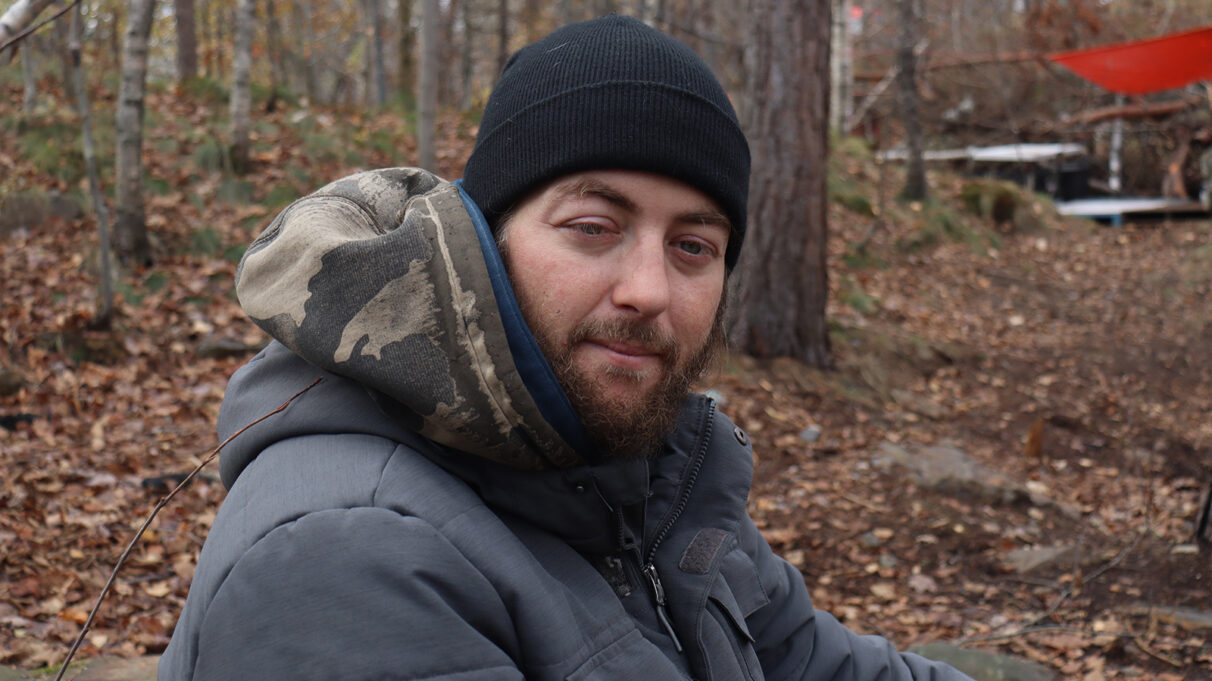
caption
Cory Wood sits on a rock at the Lower Flinn Park encampmentNeil MacFarlane, a resident of a nearby west end neighbourhood and lead administrator of the Lower Flinn Park Community Facebook group, told The Signal that many community members overcame their initial trepidation following the municipality’s decision to designate the park.
When designating encampment sites, the city assigns a limited number of tents for each. Lower Flinn Park was given a four-tent capacity.
“For the first while after the residents moved in, it was fine,” said MacFarlane. “There were only four or five residents. They mostly kept to themselves. It was very respectful.”
Over time, MacFarlane said, community perspective shifted as the number of tents ballooned to over 20. As the encampment grew, disruptive activities like theft, trespassing, violence and safety hazards were frequently reported in the surrounding neighbourhoods.
A shooting at the encampment was reported on Oct. 19, which MacFarlane describes as the tipping point for many residents.
“It put a lot of fear and anger into the neighbourhood,” he said.
Cleary said council has received multiple complaints from nearby residents, including some pushing for the de-designation of the encampment.
“The mayor and some councillors feel that (community feedback) is something we need to address as a priority over addressing issues of the people living in the encampments,” Cleary said.
But he maintains that prematurely de-designating sites will lead to a flood of new residents in remaining encampments, creating a higher likelihood of disruptive incidents.
Instead, more designated sites with smaller populations, Cleary said, “works way better than trying to have a smaller number of designated sites with a way higher population at each site.”
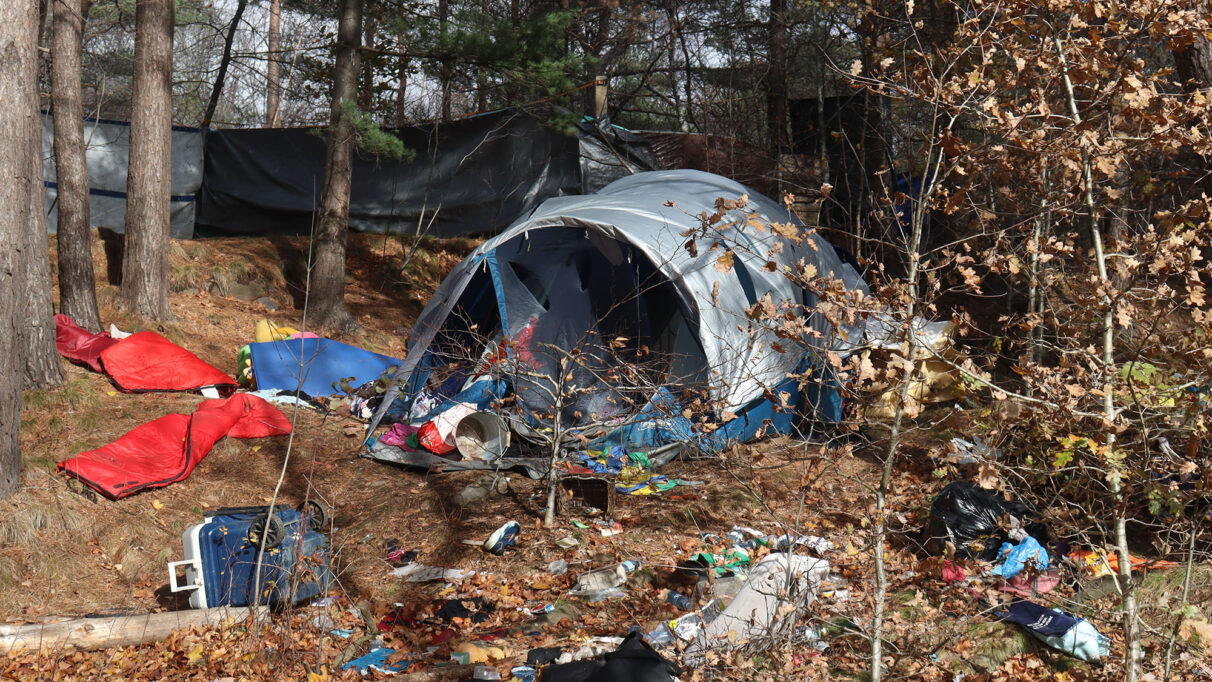
caption
An abandoned tent is surrounded by litter at the Lower Flinn Park encampment.Despite announcing certain population capacities, Wood said the city did not step in to control the growing number of tents at Lower Flinn.
“There were only supposed to be so many tents in each spot. Why not regulate that?” he said.
Wood said he sympathizes with the community’s complaints, agreeing that conflict arose as the population grew.
“I have nothing against the people. They’re trying to live their lives, right?” he said. “What ruined it was when the city closed down the Windsor Street spot.”
The Signal reached out to the city’s department of housing and homelessness — at the time, their executive director Max Chauvin said he was no longer in the role. The municipality was unable to provide comment.
For individuals like Wood and Goodsell, who are not amenable to shelter environments, “Case management is set up to support those individuals by identifying what their needs are, who’s on the by-name list and what is the most appropriate shelter, supportive housing or other option,” said Jaime Smith, the executive lead of the province’s Homelessness and Supportive Housing agency.
The municipality’s eviction notices said that outreach workers would help connect individuals to housing options.
“Tomorrow will be two weeks since the eviction (notice) and I haven’t seen any of these supposed workers yet with any of these supposed options,” said Wood. “I’m just completely beyond stressed.”
“I’m just completely beyond stressed.”
Cory Wood
Correction:
About the author

Zach Taylor
Zach Taylor is a student in the master of journalism program. He has an undergraduate degree in human kinetics from Saint Francis Xavier University....

Olivia Nitti
Olivia is in the One-Year Bachelor of Journalism program at the University of King's College.
